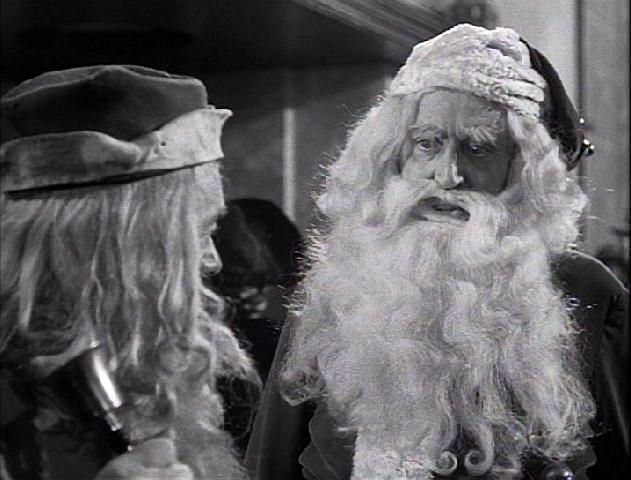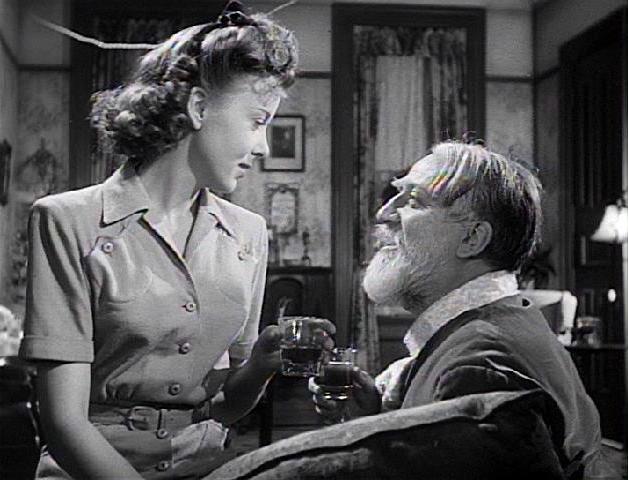There are few finer sights in the world of cinema than Monty Woolley as a drunken department store Santa singing, “My name is Samuel Hall, and I hate you one and all,” to a throng of horrified shoppers. You can keep Billy Bob Thornton’s Bad Santa, I’ll take this. Granted, it is only the opening scene in Irving Pichel’s Life Begins at Eight-Thirty (1942), but what an opening! And it leads into a surprisingly good movie that scarcely deserves its almost complete obscurity. It was made during the brief period where Woolley was an above-the-title movie star. Woolley — primarily remembered today for his acerbic wit, his impeccable beard, his sartorial elegance and his close friendship with Cole Porter — had been a theater director since 1929, but in 1939 he starred in the George S. Kaufman-Moss Hart play The Man Who Came to Dinner — in the role he was born to play, Sheridan Whiteside (a thinly-veiled version of theater critic, personality and well-known wit Alexander Alexander Woollcott). When the play finally closed in 1941, what was more natural than to have Woolley play Whiteside in the film version? After years of playing small, but distinctive, roles in a variety of movies, Monty Woolley became a somewhat unorthodox star at the age of 54.
The success of the film of The Man Who Came to Dinner snagged Woolley a contract at Fox. Life Begins at Eight-Thirty was the second film he made for the studio and his second (and last) film to be directed by Irving Pichel — a director of no particular style, who is probably slightly better remembered as an actor. (Paramount wanted to cast him in Rouben Mamoulian’s Dr. Jekyll and Mr. Hyde, but Mamoulian balked, saying Pichel could only play Hyde. If you’ve ever seen Pichel as Sandor — henchman to the title character in 1936’s Dracula’s Daughter — you’ll understand Mamoulian’s point.) In this instance, Pichel delivered a thoroughly solid movie of a kind that relied very much on the studio artistry of the era. There’s probably not a single original set or prop in the entire movie, but that was the greatness of the studio era — it was all right there and it looked like a million bucks.
It is fair to say that Life Begins at Eight-Thirty (the title referring to when the curtain went up at the theatre) is little more than Woolley as a down-on-his-luck Sheridan Whiteside with a drinking problem and a semi-disabled daughter (an unusually appealing Ida Lupino). If that sounds on the soapy side that’s because it is. However, Woolley takes the material to another level with his withering comments. There’s even a sequence where he’s gotten a part on a radio soap opera and — in an outburst that’s as politically incorrect as it is funny — skewers the imbecility of the show he’s — briefly — on. But, yes, the plot — with its revelation of how his daughter became disabled, her romance with a young composer (Wilde), and the much-abused grand old lady of the theatre (Allgood) who carries a torch for Woolley — gets pretty sudsy. It’s mostly Woolley who makes it better than it ought to be, but it’s not all him. The film has the good sense to keep it moving and to skirt the potentially gooiest patches — notably at its wholly delightful ending. It’s never going on a list of anybody’s favorite movies — except maybe favorite Monty Woolley vehicles — but as sheer entertainment, it’s aces.






Before you comment
The comments section is here to provide a platform for civil dialogue on the issues we face together as a local community. Xpress is committed to offering this platform for all voices, but when the tone of the discussion gets nasty or strays off topic, we believe many people choose not to participate. Xpress editors are determined to moderate comments to ensure a constructive interchange is maintained. All comments judged not to be in keeping with the spirit of civil discourse will be removed and repeat violators will be banned. See here for our terms of service. Thank you for being part of this effort to promote respectful discussion.